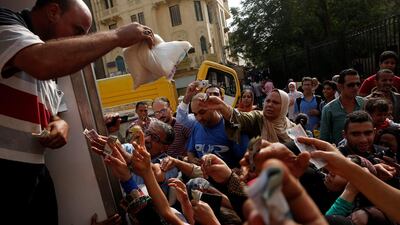If this explanation of Egypt’s sugar crisis proves complicated, I’m sorry. But please bear with me on as I try to explain why the industry has found itself in the sweet mess it’s in.
Sugar supplies have dwindled. Supermarkets and shops have run out, long queues are forming outside government cooperatives, and prices have doubled over the last few weeks. The state-owned Food Industries Holding Company has been reduced to rationing meagre sugar supplies to the food processing industry, especially soft drink makers, to keep factories running.
It all starts out in 1963, when the government nationalised the country’s private sugar refineries and bundled them under one state-owned company, to which it gave the catchy name of the Egyptian Sugar and Integrated Industries Company (Esiic). Half a century later the company is still running strong and the government is interventionist as always, although a few years ago it did allow private traders and a couple of private refiners to set up shop.
To help farmers, the government has required Esiic to buy sugar cane at prices which in the best of times are substantially above those on the international market. Even then, Egypt has only been producing about 2.2 million tonnes a year, while consuming about 3.2 million tonnes. In recent years, private traders have made up the gap by importing raw sugar in bulk and selling it to the refineries, both government and private, who then sell their product to retailers.
Until recently, the Egyptian government sold cheap sugar to consumers directly through a subsidy card. But as of early 2015 it switched over to a new system, where needy citizens were given smart cards with 15 pounds (Dh6) of credit each month that they could use to buy a number of different products, including sugar, but at regular market prices and not subsidised ones.
Because of the high cost of local raw sugar, domestically refined sugar ended up costing about 5.15 pounds per kilogram in the shops, while imported sugar cost only 4.5 pounds. At this rate, no one would buy the local product. Esiic stopped making money, which meant it couldn’t pay the farmers for the raw sugar it had just bought from them.
The government in April 2015 imposed a temporary 20 per cent import tariff on refined sugar, although not on raw sugar. The tariff increased the price of imported sugar in the shops and made domestic sugar once again competitive, so that Esiic and the farmers didn’t go broke. But all at the expense of poor consumers, of course.
As of January, Egypt had an inventory of 300,000 tonnes of carry-over from the previous year. The 20 per cent tariff had been working so well that the ministry of trade decided to renew it and expand it to raw sugar as well. By about March, however, traders began to notice that the harvest would be woefully inadequate to cover a sugar deficit expected to reach 700,000 tonnes. It was difficult convincing the cumbersome bureaucracy that it had to act quickly to avert a crisis, one trader says.
In May, the trade ministry, apparently realising a problem was brewing, removed the import tariff from raw sugar but not from refined sugar. But private traders still had little incentive to import. Foreign currency had become scarce, and they could not get dollars from the central bank to import, because the bank did not list sugar as an essential good that should get priority. They could not even raise dollars on the black market because of restrictions that the central bank had placed on depositing large sums of foreign currency in their bank accounts.
Around July, Esiic tendered for 150,000 tonnes of raw sugar, the first government purchase of the year. But it was only around August that the government began to realise how serious the problem was, says the trader.
The ministry of supply, which is responsible for distributing sugar under the smart card system, grabbed the roughly 250,000 tonnes of refined sugar stored in the warehouses of state-owned refiners, including Esiic’s. At the end of August it announced it planned to buy 450,000 to 550,000 tonnes of sugar locally and abroad. But by this time, international sugar prices were skyrocketing, with raw sugar climbing to 23-24 cents per pound from 14 cents in January. It also decided to buy refined sugar -- which is harder to ship and more expensive -- because supplies were running out and there was no time left for processing.
So many resources wasted. Is it not time to pry the sugar industry out of the sclerotic hands of the government and turn it over to the country’s more agile private traders and manufacturers.
Why is the government forcing the poor to subsidise sugar farmers and the sugar industry when the product can be bought more cheaply abroad? Surely these farmers and factories could be put to activities that actually add value, not subtract it. And why was the country discouraging imports when sugar was so cheap on international markets, and now suddenly rushing to import after prices have soared?
Patrick Werr has worked as a financial writer in Egypt for 26 years.
business@thenational.ae
Follow The National's Business section on Twitter

